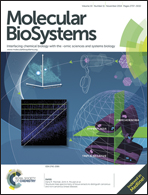Integrative analysis of transcriptomic and metabolomic profiling of ascites syndrome in broiler chickens induced by low temperature†
Abstract
Ascites syndrome (AS) still has an unacceptably high incidence rate in both humans and animals although there have been many studies on AS. To continue our previous pathological and biochemical investigation on the underlying mechanisms of AS incidence in broiler chickens, cutting-edge technologies including RNA-seq and metabolimics were used by directly comparing AS chickens and healthy controls. The RNA-seq analysis in the liver identified 390 differentially expressed genes (DEGs), among which 212 genes were up-regulated and 178 genes were down-regulated in the AS group compared to the control. For the down-regulated DEGs, further gene ontology (GO) analysis suggested that lipid metabolism, cell differentiation, enzyme linked receptor protein signaling pathway and steroid biosynthesis pathway were significantly enriched. For up-regulated DEGs, the cholesterol metabolic process has the lowest p value (0.000966) of fold enrichment while the cholesterol biosynthetic process has the highest fold enrichment (46.67). The metabolomic analysis of serum revealed statistically significant changes in the concentrations of LysoPC(20 : 4), LysoPC(16 : 0), LysoPC(18 : 0), LysoPC(18 : 1), LysoPC(18 : 2), PC(14 : 1/20 : 1), PC(20 : 4/18 : 0), PC(14 : 1/22 : 1), dihydroxyacetone, indoleacrylic acid, ursodeoxycholic acid, L-valine, and L-tryptophan. The integrative analysis of transcriptome and metabolome indicated that two biological pathways of tryptophan biosynthesis and metabolism, and glycerophospholipid metabolism may contribute to the induction of AS in broilers. These findings have provided novel insights into our understanding of molecular mechanisms of AS incidence in broilers.


 Please wait while we load your content...
Please wait while we load your content...